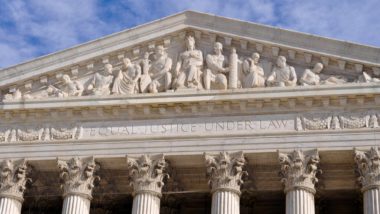Top Class Actions’s website and social media posts use affiliate links. If you make a purchase using such links, we may receive a commission, but it will not result in any additional charges to you. Please review our Affiliate Link Disclosure for more information.
An investigation shows that federal judges across the United States have violated U.S. law and judicial ethics by hearing court cases for companies that they or their families owned stock in.
What Happened?
In September 2021, the Wall Street Journal revealed that 131 federal judges failed to disqualify themselves from 685 court cases between 2010 and 2018. They or their family members owned shares of the companies that were plaintiffs or defendants in the litigation.
Of the judges, two sat on appellate courts, the remaining 129 were district judges. Since the investigation began, the Journal has found more judges and violations.
The Journal said it reviewed “hundreds of financial disclosure forms filed annually from 2010 to 2018 with the Administrative Office of the U.S. Courts.” The forms filed by federal trial and appellate judges aren’t online, so they worked with the Free Law Project to look at court data. It then compared judges’ stockholdings to the thousands of court dockets.
The Aftermath
This is the most expansive investigation of judicial stockholdings in the U.S.
As of Jan. 24, 137 judges in 796 cases have notified courts of their involvement and that their cases are eligible to be reopened. Because of this, new judges can also be assigned to the case depending on the ruling.
How Serious Is The Problem?
The Journal’s findings showed that judges in every region of the country failed to disqualify themselves. The judges involved were appointed by nearly every president, from Lyndon Johnson to Donald Trump.
Judges can own shares in a company, but a 1974 federal law, signed by President Gerald Ford after Richard Nixon’s resignation, prohibits judges from hearing cases where they own stock because of conflict of interest. When judges participate in such hearings, according to the Journal, about “two-thirds of their ruling on motions that were contested came down in favor of their or their family’s financial interests.”
Not only did the judges or their families have some sort of financial interest in the cases, but according to the Journal, they reported that they or their brokers traded the shares during the case.
What Did The Judges Say?
When asked about their violations, judges had several explanations–some blamed court clerks, and others said their lists of companies to avoid had misspellings so the conflict-screening software didn’t catch it, and some argued that they misunderstood the law and didn’t have to disqualify themselves because their stock was in an account ran by a money manager.
The Government’s Response:
Since the Journal revealed their lengthy investigation, the House of Representatives passed a bill in December to make judges’ financial-disclosure forms public and streamline the process of reporting them. The Courthouse Ethics and Transparency Act would require judges to report stock trades of more than $1,000 within 45 days. Members of the Senate are sponsoring a similar bill, aiming to pass it in 2022.
Judiciary Committee members have also introduced several bills to update the judiciary’s ethics, transparency, and disclosure rules.
In December, the Senate Judiciary Committee passed a bill to improve access to the federal court’s electronic records by removing the PACER paywall, making documents free to most users.
In December, Chief Justice John Roberts, who heads the judiciary, also promised to improve the judiciary’s ethics training and compliance.
What Can You Do?
If a judge notifies a court clerk of this type of violation, the parties involved in the case can ask the court to rehear the case with a new judge.
If you currently have a pending case involving a company, you can ask your lawyer to contact the Administrative Office of the U.S. Courts to obtain the latest financial disclosure forms of the judge so you can determine whether he or she has any conflicts or violations. It is important to note disclosures are filed only annually.
Judges are also notified when someone asks to see their financial disclosures. Some lawyers argue this can prevent some people from asking out of concern that they may annoy a judge who they frequently see in court.
[getsocial app=”sharing_bar”]
Don’t Miss Out!
Check out our list of Class Action Lawsuits and Class Action Settlements you may qualify to join!
Read About More Class Action Lawsuits & Class Action Settlements:
ATTORNEY ADVERTISING
Top Class Actions is a Proud Member of the American Bar Association
LEGAL INFORMATION IS NOT LEGAL ADVICE
Top Class Actions Legal Statement
©2008 – 2024 Top Class Actions® LLC
Various Trademarks held by their respective owners
This website is not intended for viewing or usage by European Union citizens.















8 thoughts onU.S. federal judges violated ethics laws hundreds of times over a decade
When it comes to Judges Baker Donelson, et al is the link to an alleged monopoly on the planet as they represent almost all major corporations as well as the USA and Israel. Since they sit on almost all banking boards, healthcare advisory committe and Panel V of the Judicial nominating committee, etc. it’s almost inevitable that every judge that they’ve bribed or coerced makes the list that much longer.
Please add
Please add me
add me
Please add me
After several months and getting the ok from a mediator a Judge in Federal Judge Detroit threw out our case and ordered us to pay the other side, even though we had several woman who this involved
Please add me
Add me